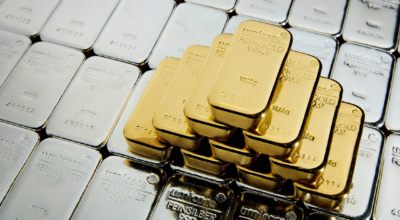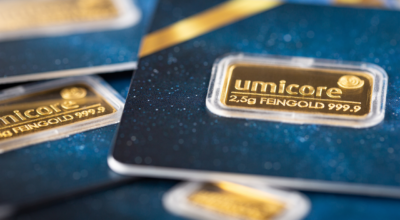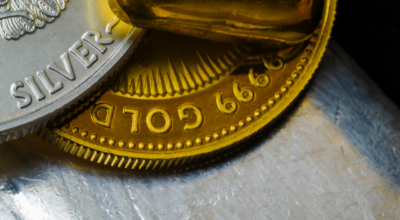Gold Challenges Keynes and About Gold As a Hedge Against Uncertainty
- Mises Institute: Gold Will Destroy The Keynesian Fallacies
- Forbes: Gold Can’t Be Downgraded and It’s No One’s Liability
- El Pais: A gold mine in the trash: how precious metals are recovered from discarded devices
Mises Institute: Gold Will Destroy The Keynesian Fallacies
26 Aug 2023
Patrick Barron
Leaders of Western democracies are ill-prepared to address the impending shift away from the fiat dollar’s dominance in international trade settlement, which has persisted since the Bretton Woods Agreement’s end in 1971. The ongoing BRICS summit in Johannesburg, South Africa, is likely to lay the foundation for an alternative trade settlement system based on commodities, potentially including gold. Various non-Western and some Western-affiliated nations, including new members like Argentina, Egypt, Ethiopia, Iran, Saudi Arabia, and the United Arab Emirates, are participating with keen interest.
While this change might seem to pit Western democracies against BRICS nations, the true clash centers on economic theories: Keynesianism versus the gold standard. The victor seems poised to be gold. The debasement of the fiat dollar, a 98% drop in purchasing power against gold since 1971, and the imposition of “Russian Sanctions” with SWIFT exclusion catalyzed the challenge. Russian monetary expert Sergey Glazyev has played a leading role in the push for an alternative system.
The introduction of gold into trade systems will debunk the core fallacy of Keynesian economics, which prioritizes aggregate demand over production. The gold settlement system, as suggested by Alasdair Macleod, will necessitate settling trade in gold and will be more advantageous for member nations beyond the current BRICS. The new system will reduce government spending and incentivize market-based economic reforms. It will hold member nations accountable for productive, rather than wasteful, economic practices.
Over time, the gold settlement system may even extend to members’ internal monetary systems, displacing fiat currencies susceptible to government manipulation. Ultimately, gold’s resurgence could relegate fiat currencies to the past, echoing Keynes’ own prediction from 1924.
Forbes: Gold Can’t Be Downgraded and It’s No One’s Liability
20 Aug 2023
Bob Haber (contributor)
“We have gold because we cannot trust governments,” stated President Herbert Hoover. The rarely quoted Hoover’s words from 1933 resurface in the context of economic concerns. Back then, incoming President Roosevelt disregarded Hoover’s advice, leading to the Emergency Banking Act and the devaluation of the US dollar. Fast forward to 2023, a headline reveals Fitch Ratings downgrading US government debt due to excessive debt issuance. The United States is projected to accumulate billions in debt annually for the next decade. The downgrade raises questions about the US dollar’s strength as the reserve currency.
The article discusses the significance of gold as a hedge against economic uncertainty. It compares the historical US debt downgrade in 2011 to the current situation of even higher public debt. The downgrade’s impact on the US dollar’s dominance and the rise of BRICS nations’ influence is explored. The author recommends diversifying portfolios with gold due to its historical value and independence from liabilities. Central banks’ interest in gold is highlighted, and gold’s performance during yield curve inversions is discussed. The text suggests closely monitoring the yield curve and encourages buying gold on market weakness. The article concludes by referencing Hoover’s mistrust of governments and their management of currency.
El Pais: A gold mine in the trash – how precious metals are recovered from discarded devices
19 Aug 2023
Raul Limon
Electronic waste, often referred to as e-waste or waste electrical and electronic equipment (WEEE), has become a veritable goldmine for valuable metals. A ton of discarded mobile phones, for instance, contains more gold than a ton of mined ore. This realization has prompted the construction of a pioneering recycling plant by the international mining company Atlantic Copper in Huelva, Spain.
According to Ruediger Kuehr, a professor at the University of Limerick and head of the United Nations Sustainable Cycles Programme, the staggering statistics speak for themselves: in a million cell phones, there’s approximately 24 kilograms (53.71 pounds) of gold, 16,000 kilograms of copper, 350 kilograms of silver, and 14 kilograms of palladium. These materials are essential components of electronic devices, and given the surging demand for electronics, they’re becoming increasingly scarce.
Atlantic Copper’s recycling plant, which is set to be the seventh of its kind worldwide, aims to extract these valuable materials from discarded electronic devices. As the demand for metals and minerals is projected to multiply by 12 over the next 25 years, the need to explore alternative sources becomes evident. Extracting materials like gold, silver, platinum, palladium, and more from the Earth is expensive and ecologically harmful. On the other hand, these very same materials are found in discarded electronics, which could serve as an urban mine.
The process of recycling these valuable metals involves a complex technological process. Waste managers initially sort the recyclable materials, some employing artificial intelligence to do so effectively. The recycled materials include non-ferrous and precious metals, circuit cards, and more. Atlantic Copper plans to recover substantial amounts of copper, tin, nickel, and precious metals like gold. The project also highlights the increasing importance of recycling in an environmentally conscious world.
Image: Atlantic Copper, smelting gold at the Atlantic Copper plant in Huelva, Spain
If you’re considering to buy gold online, Jalonom offers a variety of gold products, providing a convenient and secure method to acquire this precious metal.






